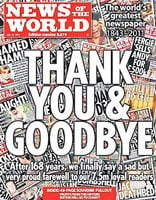Britain's Cameron warns press regulation must change

Cameron's comments came a day before senior judge Brian Leveson is due to publish his findings from a year-long inquiry into press ethics, which are widely expected to include recommendations for statutory regulation.
The prime minister told lawmakers that he hoped the process would lead to "an independent regulatory system" for the press and called for a cross-party consensus, but did not say if he supported new laws.
Cameron set up the Leveson inquiry in July 2011 after the discovery of widespread hacking of voicemails and other illegal practices at Murdoch's News of the World tabloid, which the Australian-born tycoon then closed down.
"The status quo, I would argue, does not just need updating, the status quo is unacceptable and needs to change," he told parliament.
"This government set up Leveson because of unacceptable practices in parts of the media and a failed regulatory system."
The British press is currently self-regulated by the Press Complaints Commission, a body staffed by editors, which critics say is toothless. Cameron called for lawmakers to work across party lines on the issue.
"What matters most is that we end up with an independent regulatory system that can deliver and in which the public will have confidence."
The leader of the main opposition Labour party, Ed Miliband, described the inquiry as "a once-in-a-generation opportunity for real change and I hope that this House can make it happen".
Cameron will give a statement to parliament on Thursday following the publication of Leveson's report and there will be a parliamentary debate next week on its recommendations.
The prime minister's Downing Street office received "half a dozen" advance copies of Leveson's 1,000-page report on Wednesday so that Cameron can prepare his statement, a spokesman said.
He is not obliged to follow the report's recommendations but they are likely to present him with a dilemma amid splits in his Conservative party over the need for statutory regulation.
More than 80 lawmakers from the three major parties said in a letter published Wednesday that any introduction of statutory regulation would be the biggest blow to media freedom in Britain for 300 years.
"As parliamentarians, we believe in free speech and are opposed to the imposition of any form of statutory control even if it is dressed up as underpinning," said the letter published in the Guardian and Daily Telegraph newspapers.
It added: "No form of statutory regulation of the press would be possible without the imposition of state licensing, abolished in Britain in 1695."
London 2012 Olympics chief Sebastian Coe was among the senior Conservatives who signed the letter, as well as former defence minister Liam Fox and former Europe minister David Davis.
One MP from the Liberal Democrat coalition partners, John Hemming, also signed along with several Labour lawmakers, including Kate Hoey, a former sports minister, and Frank Field, a former welfare minister.
But 42 MPs from the centre-right Conservatives, who are the senior partners in a coalition government with the centrist Liberal Democrats, have previously written a letter calling for strong new press laws.
Hollywood actor Hugh Grant, who has spoken out on behalf of victims of phone hacking, also called for new laws.
"What people are campaigning for is an end to newspapers being able to regulate themselves, marking their own homework," the "Four Weddings and a Funeral" star told BBC television.
The Leveson inquiry heard eight months of testimony from hacking victims, politicians and media figures.
Cameron set up the inquiry after it emerged that the News of the World had hacked the phone of Milly Dowler, a murdered schoolgirl, as well as targeting dozens of crime victims, celebrities and politicians.
British police have launched three linked investigations into misdeeds by newspapers, while Cameron's former spokesman Andy Coulson and ex-Murdoch aide Rebekah Brooks have both been charged with phone hacking and bribery.
Source: AFP
Source: I-Net Bridge

For more than two decades, I-Net Bridge has been one of South Africa’s preferred electronic providers of innovative solutions, data of the highest calibre, reliable platforms and excellent supporting systems. Our products include workstations, web applications and data feeds packaged with in-depth news and powerful analytical tools empowering clients to make meaningful decisions.
We pride ourselves on our wide variety of in-house skills, encompassing multiple platforms and applications. These skills enable us to not only function as a first class facility, but also design, implement and support all our client needs at a level that confirms I-Net Bridge a leader in its field.
Go to: http://www.inet.co.za














